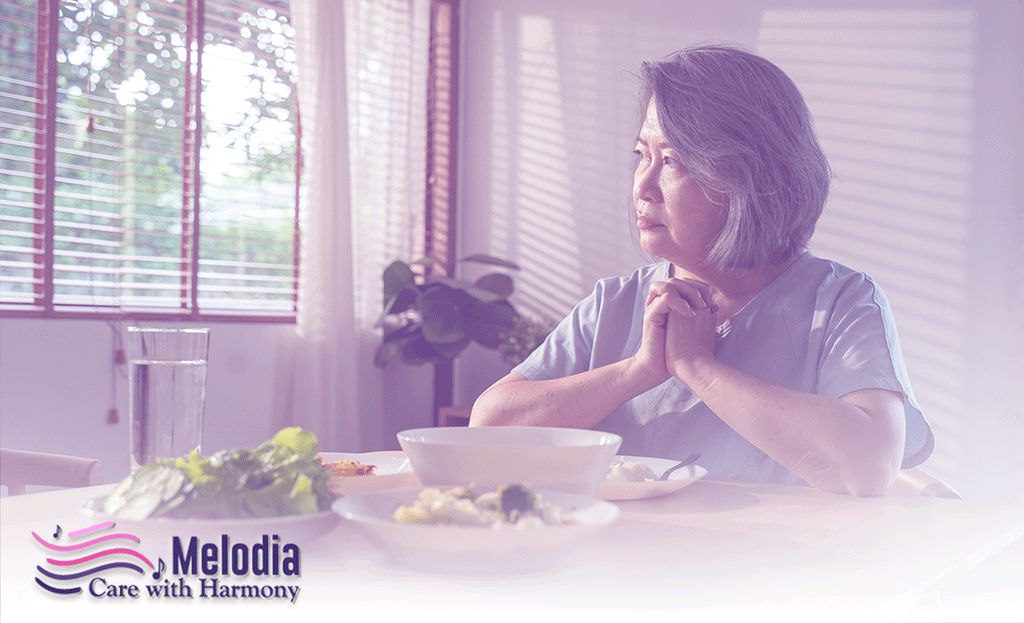Few things are more complex than witnessing a loved one deteriorate due to a terminal illness. When family members and carers observe that their hospice patient has stopped consuming and drinking at the end of life, the situation becomes even more difficult.
To make eating less intimidating:
- Prepare nutritious dishes that are simple to reheat.
- Clear out their refrigerators and cupboards, as cooking or eating will be less challenging.
- In addition, make the food more straightforward to consume by chopping it into smaller pieces or preparing soft or more manageable meals.
Find someone to share a meal with your parents so they do not have to eat alone. However, the problem may be associated with dental, vision, medication, health, or mobility issues necessitating a doctor’s visit. Involving your parent’s doctor in the investigation is recommended to help determine the cause and find a solution.
With your assistance, you can make consuming more food simpler for a loved one. Start by providing regular meals and refreshments. The body can get used to eating at certain times, even if the person is not necessarily hungry. You can also reduce the quantity of their meals to make them less intimidating. Alternately, choose simpler foods without utensils, such as poultry nuggets, cheese, and vegetables. Soups, smoothies, and even nutritious milkshakes can help older people eat if they cannot consume their regular meals, so keep these items on hand.
When is the appropriate time to stop feeding someone who receives hospice care?

The requirements for food and water for a person who is terminally ill are very different from those of a robust and active individual. As a person nears the end of their life, their body slowly becomes less able to digest and absorb food and drink. This can be a very uncomfortable and distressing experience. If any nutrition, hydration, or fluids are required, it will likely be in tiny amounts when organs and body functions begin to shut down. In determining whether to discontinue providing hospice patients with food and water, we propose utilizing the progressive decline of the patient’s body as a signal.
Melodia Care Hospice always works with patients and families to build individualized care plans that reflect the patient’s choices and values. As part of developing these plans, a conversation about the appropriate use of artificial nourishment and hydration is always included.
What does it signify when older people cease to eat and drink?

If you care for an elderly family member, they might decline to eat or only eat specific foods. Changes in energy levels, basal metabolic rate, and physical activity due to aging can reduce appetite. However, symptoms such as sudden weight loss and restricted meals are concerning for several reasons.
Losing at least 10 percent of body weight can negatively impact the body’s recovery process. Additionally, older adults who experience this level of weight loss have higher average mortality rates.
A diminished appetite can signify melancholy, deteriorating health, or a sedentary lifestyle. They may lose their need for food and liquids. If someone has trouble eating or drinking, this could be the reason. However, they may also have little to no appetite or nutritional requirements.
In addition, older adults consume less than they did when they were younger because their metabolism tends to slow down, and their bodies may have fewer nutritional requirements; however, if they have abruptly begun eating less, there may be another cause. Visiting the doctor may be necessary if your parents refuse to consume, mainly if they refuse to drink liquids.
How to encourage a senior to eat?

There are methods you can use to encourage your loved one to consume more food. First, provide daily meals and refreshments at consistent times. This will help their bodies become accustomed to eating at specific times, even when not famished.
Provide sustenance in smaller portions. By doing so, you will find that they are more willing to consume than when presented with a large plate of food. Additionally, provide more finger foods if your loved one has difficulty using utensils. This can include cheese, raw veggies, and even poultry nuggets. When seniors cease eating, healthy snacks can also be helpful.
Be sure to have plenty of their favorite foods on hand and soft foods such as soups, smoothies, and nutritious milkshakes when considering what to do when older people refuse to eat.
How can hospice care to assist an elderly parent who is not eating?

Hospice care can provide valuable support and assistance to an elderly parent who is facing difficulties with eating. Firstly, a hospice care team, including doctors, nurses, and nutritionists, can assess the underlying causes of the diminished appetite and provide appropriate medical interventions. They can offer guidance on modifying the diet to meet the parent’s specific needs, ensuring it is both nutritious and palatable. Hospice professionals can also offer emotional support and counseling to the parent and their family, addressing any concerns or anxieties related to eating. Additionally, they may suggest alternative mealtime strategies, such as smaller, more frequent meals or the inclusion of favorite foods, to encourage eating. Through their comprehensive approach, hospice care aims to improve the quality of life for the elderly parent, ensuring their comfort and well-being during this challenging time.
Medication adverse reaction

Certain medications can affect the metabolism of the elderly. Antidepressants, cardiac drugs, antibiotics, and stimulants are included. The adverse effects include nausea, vomiting, diarrhea, unpleasant mouth tastes, and parched mouth.
A live-in carer can work with your physician to determine which medications are causing adverse effects. They will be trained to recognize health changes and seek professional assistance. They will manage your loved one’s medication schedule so that they take their medications as prescribed. This can minimize some adverse effects due to timely medication administration.
Social isolation and depression

Eating is an important social activity. Your loved one has relished socializing with friends and family while dining for many years. There could be reasons why this is no longer feasible. This includes issues with mobility or infirmity, diminished independence, social isolation, and losing a loved one. If a person encounters these circumstances, they are likely to develop depression. Low mood is linked to a diminished appetite in some individuals, which may explain why an elderly parent is not eating.
With a live-in care service, a carer will facilitate socialization with family and acquaintances. They can plan and prepare a meal for the family, arrange a celebration at home or in a restaurant, or accompany their loved one to local cafes. This will promote a positive mood and boost self-esteem while encouraging your loved one to appreciate meals and mealtimes.
Not able to buy or prepare food at home

Due to mobility/frailty issues or poor health, many elderly individuals may be unable to go to the store to buy food and other necessities. They may also need to be more capable of planning, preparing, and cooking meals. Due to this, many families must support their elderly parents who are not consuming. This can be challenging if you are separated from your loved one. Some individuals rely on home-delivered meals. Others prepare food for a loved one’s freezer to ensure they have the required nutrition.
If you have an elderly family member who needs help with meals, a live-in caregiver can assist with planning, shopping, and preparing food. They are there to monitor changes in the appetite of your loved one. If there are adverse changes and your elderly parent is not eating, the attendant will work with the physician or gastroenterologist to determine the cause of the change in appetite. They can collaborate closely with your loved one’s registered dietitian to choose alternative means of meeting their nutritional requirements. A 24-hour live-in attendant is available to ensure that any recommendations are implemented and progress is monitored.
How Long can hospice patients exist without food?

Given the numerous variables, one may question how long a hospice patient can survive without water and food. Due to discontinuing food and water intake, patients may pass away within a few days. This period without food typically lasts about ten days for most individuals, but in rare cases, it can last several weeks.
Why do elderly people stop eating?

Elderly people may stop eating for various reasons, and it is often a complex combination of physical, psychological, and social factors. Some common reasons include:
Loss of smell and taste

Multiple senses are required for eating. The importance of scent is intimately connected to our ability to taste and directly impacts our appetites. Age causes a decline in the senses of smell and flavor for many adults. This dulling of the reasons significantly affects how seniors perceive food and can reduce their appetite.
A carer can modify recipes to include more flavorful seasonings, herbs, and vegetables to improve a senior’s dining experience. Using aromatic ingredients such as onions, garlic, ginger, celery, or carrots at the beginning of cooking creates deeper, flavorful foundations for various cuisines and enticing aromas.
Adding sugar, sodium, and fat to a senior’s diet is a simple but unhealthy way to enhance their food’s flavor. This is why some senior citizens prefer sweet delights and junk food to nutritious ingredients. Use fresh herbs, a squeeze of citrus, seasonings, extracts, and various cooking methods to enhance the flavor and aroma of a loved one’s meals.
Low eyesight

As seniors age, they may experience vision impairments, significantly affecting their ability to see and perceive food. They will likely lose interest in food if they cannot see it clearly, particularly when combined with diminished taste and smell. A senior with impaired vision may also find searching for and preparing nutritious foods difficult or even dangerous.
To improve the visual appeal of a senior’s meals, serve healthy, colorful foods, separate each element so it is clearly defined on the plate, and use dishes with contrasting colors. Modify the plate presentation daily to add variety to meals.
Drug adverse effects

Some medications, such as Alzheimer’s medications, antidepressants, cardiac medications, antibiotics, and stimulants, have side effects that can alter a person’s eating patterns. Ask your loved one’s physician or chemist if any of their prescriptions or medical treatments could be causing a direct loss of appetite or other related symptoms, such as constipation, nausea, vomiting, diarrhea, poor taste in the mouth, or dry mouth. The physician may recommend working with a dietitian to provide a non-pharmaceutical intervention or modify the patient’s medication regimen to minimize these adverse effects.
Constipation

Aging, as well as several prescription and over-the-counter medications, frequently result in a sluggish digestive system. Some unpleasant constipation symptoms, such as bloating, abdominal pain, and a sense of fullness, can reduce appetite. Help your loved one gradually increase their fiber and fluid intake, and motivate them to participate in physical activities regularly. Even a casual stroll can get things moving. Laxatives should be avoided, which are not intended for long-term use and can worsen the situation. If the problem persists, collaborate with your loved one’s doctor to develop a personalized treatment plan for relieving digestive issues and restoring a healthy appetite.
Dental health concerns

Seniors who experience difficulty chewing may have dental issues related to their teeth, gums, or dentures. The mouth and mandible can gradually change if a senior has periodontal disease. Dentures and other oral appliances that do not fit properly can become loose or uncomfortable or cause excruciating sores and irritation. An old can continue eating generally if they receive regular dental examinations, preventing significant dental issues.
Soft, moist, and smaller-sized foods are more straightforward for those experiencing oral discomfort. For example, serve cooked vegetables rather than uncooked ones. Choose fish, plant-based proteins such as legumes and lentils, recipes that include ground meat, or cuts that can be cooked until tender instead of steak or pork chop. Serving meals with nutritious sauces can moisten ingredients and make chewing and swallowing easier, particularly if a loved one has dry mouth symptoms.
Dining alone

Meals are frequently more enjoyable when shared with others. Numerous senior citizens grew up with sit-down family dinners where loved ones discussed the day’s events. Seniors with no significant other to dine and converse with may experience lonely mealtimes.
Whenever possible, attempt to eat with your significant other. Invite additional family members, friends, and neighbors to join them for lunch, supper, or even tea and an afternoon snack regularly. Look for local “congregate meal events” hosted by senior centers, churches, and other community organizations. Your local Area Agency on Ageing can provide information on whether volunteer chauffeurs or specialized transit services are available to assist with transportation.
If seniors are unwilling or unable to purchase and prepare nutritious meals, their health and eating habits may suffer. Many family carers choose to prepare meals for their loved ones; however, this can be challenging for long-distance carers, those who work, and those who have their own families. Meals on Wheels and paid meal delivery services.
In-home care is another option that can offer a variety of advantages. Home care is distinctive in providing seniors with companionship, meal preparation, and light housekeeping in the comfort of their residences. Professional carers can assist clients with nutrition and other activities of daily living (ADLs) if necessary.
What is a typical appetite for seniors? What concerns should I be worried about?

The aging process is accompanied by various physiological, perceptual, and other changes that can result in a loss of appetite in the geriatric. It is usual for senior citizens to require fewer calories due to a slower metabolic rate and decreased physical activity. Age-related dental issues and gastrointestinal changes (lactose intolerance) can also influence appetite. Likewise, regular changes in the senses of smell, taste, and even hearing can impact the enjoyment of food.
However, it is cause for concern if your loved ones make poor food choices due to changing preferences or the need to eat more. Because vitamin or nutrient deficiencies can lead to serious health issues, seniors must receive the proper nutrition for their changing dietary requirements.
In addition to malignancies of the head and neck, salivary gland dysfunction, thyroid disorders, mouth and throat infections, or periodontal disease, Parkinson’s and Alzheimer’s disease are associated with alterations in taste and appetite. Any unexplained changes in the dietary health of your loved ones, such as weight loss, weight gain, or general malaise, should be evaluated by a doctor.
How can I stimulate my elderly loved ones’ appetite?

If you are concerned about your elderly loved ones’ lack of appetite, there are a few practical steps you can take to ensure they receive adequate nutrition:
- Enhance nutrient density rather than portion size. Increase the nutrient density, not the volume, of the dishes they serve. Olive oil, a small peanut butter, or avocado can frequently add healthful calories.
- Establish a regular dietary routine. “Our bodies, as well as our hunger and thirst signals, thrive on routine, so when we deviate from our usual patterns, so does our appetite,” Beginning gradually, add a small beverage and nibble to a regular meal. This can help restart the body’s appetite signals.
- Encourage communal meals. For individuals of any age, dining alone can diminish appetite. Accessibility and availability of social contact can be even more problematic for seniors. Checking out the meal options at senior centers, temples/churches, and community centers, along with meal “dates” with friends, family, or carers, may be of great assistance. Even meal delivery services are of help.
- Be knowledgeable about medication’s adverse effects. If dry mouth is the issue, “chewing sugarless gum, brushing frequently, or using an oral rinse before meals can improve taste sensation and, consequently, nutrient absorption.” Attempt other protein sources, such as legumes or dairy, if meat tastes “off”; it is a common complaint that certain medications make food taste metallic. Add herbs, sliced fruits, or vegetables like lemon or cucumber if the water doesn’t taste right.
Hospice care concentrates on providing comprehensive care so that a patient with a terminal illness can pass away in serenity and with dignity. Has the physician recommended hospice care for your loved one’s final days? Contact Melodia Care Hospice for more information about our compassionate hospice care services, designed to assist patients and their families during this difficult time.








